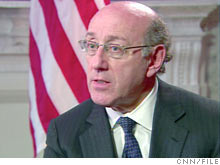Pay czar: Next ruling may carry more clout
Executive compensation guru for TARP says decisions on middle managers, due in December, could resonate nationwide.
 |
| Pay czar Ken Feinberg says watch for the next round of pay caps. |
WASHINGTON (CNNMoney.com) -- The next round of executive pay decisions for companies that have received substantial government bailout funds could have a more lasting impact on pay practices nationwide, the special master on pay for the bailout said Tuesday.
Kenneth Feinberg, the so-called pay czar of the Troubled Asset Relief Program (TARP), last week imposed caps on those who hold the top 25 positions at seven companies in which the government has a substantial stake, including AIG (AIG, Fortune 500), Citigroup (C, Fortune 500) and Bank of America (BAC, Fortune 500). He also demanded that each of the bailed-out companies reduce compensation for the 25 highest-paid employees by an average 50%.
His next round of edicts, due in December, will set guidelines, as opposed to dollar amounts, for those who occupy the next tier of jobs, or the top 26 through 100 employees.
Feinberg, speaking at a Georgetown University symposium in Washington, said the guidelines will reflect already established principles, with reduced cash salaries and more emphasis on tying pay to long-term company performance.
"I think that the most likely area where I'll have long-term impact is, frankly 26-100," he said. "The compensation structures that I have to come up with will be sort of a blueprint that these companies have to follow in setting their own compensation for their other employees."
"Maybe, there, other companies and regulators will pick up on what I'm doing, " Feinberg added.
He said a wider impact could follow if the Securities and Exchange Commission, (SEC) the Federal Reserve, Treasury and his office, all work together to create a broader effort to regulate executive compensation.
While the agencies are talking about their efforts on executive pay right now, they haven't started coordinating in such a way yet. However, last week, on the same day that Feinberg's announcement came out, the Fed released its plans. It will review pay practices at 28 of the nation's largest banks to make sure employees are not tempted to make the kinds of risky bets that helped sink firms such as Lehman Brothers.
Feinberg noted that critics have predicted that his recent decision capping executive pay will have little to no impact on pay practices in the private world. But he said that's he's hopeful.
"Maybe there will be some private voluntary effort to restructure and better regulate, privately, corporate pay," he said.
The pay caps announced last week take effect in November and serve as a base for executive pay in 2010.
President Obama appointed Feinberg in June to review compensation practices at the seven companies, which the government has the greatest stake in.
Feinberg stressed that the law limited his job in scope and he said that his orders were in no way "vindictive."
"I'm not riding into this on a white charger," he said. "My goal is implement the law. . .I'm acting pursuant to Congress." ![]()

